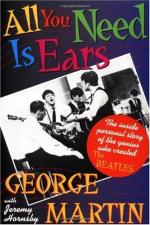
|
| Name: _________________________ | Period: ___________________ |
This test consists of 5 multiple choice questions, 5 short answer questions, and 10 short essay questions.
Multiple Choice Questions
1. While George Martin's main instrument was the piano, what was his second instrument at music school?
(a) Guitar.
(b) Flute.
(c) French horn.
(d) Oboe.
2. During his first meeting with George Martin, the Beatles' manager said that everyone in Liverpool described them in what way?
(a) Twenty-three skidoo.
(b) The bee's knees.
(c) The cat's pajamas.
(d) The best thing since sliced bread.
3. Why does George Martin say he could not have written Beatles tunes?
(a) He could not play the guitar.
(b) He lacked their ability to tell a story through song.
(c) He lacked the group's simple approach.
(d) He lacked their rhyming ability.
4. At the time "All You Need Is Ears" was written, what equipment was used to alter the pitch of a human voice recording?
(a) Vocal Harmoniser.
(b) Eventide Harmoniser.
(c) Harmonising Vocaliser.
(d) Harmonising Eventide.
5. Early in Chapter 1, when the Beatles stood up George Martin, where did he find them?
(a) The Hotel Georges Cinq.
(b) The Hotel Jacques Trois.
(c) The Hotel Jacques Cinq.
(d) The Hotel Georges Deux.
Short Answer Questions
1. In what year was George Martin born?
2. What is the length of the tubing in a French horn?
3. Who was the manager of the Beatles in 1962?
4. George Martin explains that, in 1954, what was true about singer/songwriters?
5. At the end of Chapter 1, who offered George Martin a job?
Short Essay Questions
1. Describe the flat George Martin grew up in, especially its sparse amenities.
2. Relate one anecdote from George Martin's early career at Parlophone, as described in Chapter 3.
3. Why did George Martin's childhood piano lessons end after only eight sessions, and how did he continue to improve his skill?
4. Whom does George Martin consider to be his fairy godfather, and how did the two meet?
5. How did George Martin come to record "At the Drop of a Hat" with Donald Swann and Michael Flanders, and what was unusual about the recording method he used?
6. Why did the Beatles stand up George Martin in 1964, as described in Chapter 1?
7. Describe the circumstances that led George Martin to marry his first wife, Sheena, and the tragedy, which occurred shortly thereafter.
8. Briefly describe George Martin's first meeting with the Beatles' manager, Brian Epstein, in 1962.
9. Why did George Martin have trouble plugging "Love Me Do", which only reached number 17 on the charts?
10. How does George Martin compare the nature of singer/songwriters in the 1950s, when he started at Parlophone, with the situation in 1979, when "All You Need Is Ears" was published?
|
This section contains 995 words (approx. 4 pages at 300 words per page) |

|




